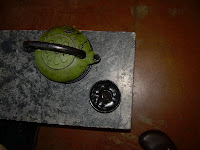At
Romcon. An excerpt (where they're about to make love.)
Here.
At
Jeannie Lin's blog. A fellow author's take on
Black Hawk -- always interesting what other authors see --
Here.
You should click on 'books' up at the top and go see her covers. Some of the loveliest in the business.
At
the Debutante Ball. An interview. That's
here.
Visiting the excellent writers at
Risky Regencies.
Here. There's an excerpt there and some discussion of cats, birds and dogs arising out of why the book is titled
Black Hawk.
Where to Buy Black Hawk
Oh. I should mention that you can buy
Black Hawk, (and it is on special sale in both sites,) at:
Amazon
Barnes and Noble
Some Interviews with Me and Some Comments on Black Hawk
At Booktopia. Nine interesting questions about the writing life.
Here.
At
History Hoydens. An interview where I talk about the problems of plotting
Black Hawk. There is no corner of that blog that is not interesting.
Here.
At
Romance Dish -- you will find just the most flattering and wonderful review
here . That is four wonder folks --Gannon Carr, Buffie Johnson, PJ Ausdenmore, and
Andrea Williamson who support Romance genre in all its forms.
Melanie and I, at
Bookworm 2 Bookworm, do an interview, talking about the age of the hero and heroine, talking about writing in general and plugging
Black Hawk. That's
here. Bookworm has also posted such a lovely review of
Black Hawk.
Here.
Reader I created him has another interview with me. And it is so thoroughly another interesting place you should be visiting just on general principles anyhow. That's
here.
And I got an excerpt right here (or Rat Cheer as we say in the South):
His chin was shadowed with a need to shave. She had known a boy three years ago. She did not really know this young man.
I do not know how to ask. Everything I can say is ugly. I do not want this to be ugly.
She gave her attention to pouring hot water onto the tea leaves. Rain drummed on the roof. Since they were not talking, since they were not looking at each other, it seemed very loud. He said, “As soon as you drink that, you should leave. It’s getting worse out there.”
I must do this now, before I lose my courage. “I am hoping to spend the night.” She chose words carefully, to clarify matters beyond any possibility of misunderstanding. “It is my wish to spend the night with you, in your bed.”
Hawker was silent. He would be this self- possessed if tribesmen of the Afghan plains burst through the door and attacked him with scimitars. The refusal to be ruffled was one of his least endearing traits.

Time stretched, very empty of comment, while she swirled the teapot gently and he was inscrutable. Finally, he took the oil lamp from the end of the mantel and busied himself adjusting the wick, lighting it with a paper spill from the fire. “The hell you say.”
Buying Black Hawk Overseas
Black Hawk is available as an English language book in Germany at amazon.de,
here. They don’t seem to sell the kindle version in Germany. In the Netherlands, one can order the paperback
here , in theory, but possibly not in practice. The book is available on kindle at amazon.uk
here but won't be out in paperback till January 19th. (Thank you, Ute, for the information.)
Book Depository has it
here for free delivery worldwide.


















































